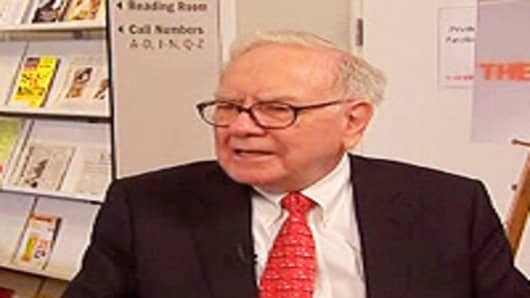Throughout his wildly successful, decades-long investing tenure, Warren Buffetthas offered investors countless nuggets of wisdom which can greatly aid everyday investors in their attempts to navigate any market environment.
For this reason, it is no wonder that the investor's life and actions have been closely monitored by droves of Buffett fans who hang onto his words documented across numerous articles, videos, books and other media.
Abiding by his rulebook has been instrumental in Buffett's ability to create his massive fortune. However, as we have seen just this year, Buffett himself doesn't always stick to the points he, himself, has laid out.
At the start of 2010, Buffett vigorously expressed his disapproval of the use of share splits and excessive use of company equity to fund M&A activity.
When food giant Kraft was pushing to purchase U.K. candy maker Cadbury, the so-called Oracle of Omaha called the share-fueled plan "dumb." The investor reasoned that, by issuing new shares, the company injects excessive supply into the market and dilutes shareholder power.
Despite his reservations, in order for the Oracle to fund his $34 billion bid for the remaining shares of Burlington Northern Santa Fe Railroad a handful of months later, he laid out a plan which included a significant share split of Berkshire Hathaway Class B shares.
While these deviations, like the Kraft/Burlington Northern episode, are often more peculiar than detrimental, as we saw late last week, breaking a Buffett rule can be costly, even for Buffett.
Perhaps the most criticized example of Buffett breaking his own rules is his stance on derivatives....
In a now famous letter to his shareholders, the Berkshire Hathaway chairman took aim at derivatives, labeling them, "financial weapons of mass destruction." Given this harsh stance, one would think that Buffett and his company have made efforts to steer clear of these complex and risky products.
"Sometimes the investor himself has overlooked his own rules and it has weighed on his company's performance."
This assumption, however, would be false. In reality, his firm manages a massive derivative portfolio valued at over $60 billion.
Recently, his heavy exposure to these products backfired.
In the third quarter of 2010, Berkshire Hathaway saw profits decline by over 7 percent, with poor derivative bets alone leading to a $700 million quarterly loss.
Interestingly, while derivatives proved detrimental to the firm, the traditional stock investments which Buffett is far better known for were seen as an element of strength in the Berkshire Hathaway report.
An uptick in demand stemming from the ongoing economic recovery helped lift Burlington Northern. This helped to offset some of the losses resulting from his derivatives.
As we have seen throughout this year, sometimes the investor himself has overlooked his own rules and it has weighed on his company's performance. Still, despite his stumbles, investors can still benefit from abiding by his investing advice and market commentary.
The lion's share of Buffett's success and popularity as an investor has hinged on his ability to pick out and invest in undervalued, easy-to-understand companies that have long-term upside potential. By largely sticking to these criteria he has been able to build a massive fortune which places him third on the list of the world's wealthiest individuals.
Follow Buffett & Berkshire News:
- Berkshire Hathaway Portfolio Tracker
______________________________
CNBC Data Pages:
______________________________
Disclosures:
In addition to writing ETF Action, Don Dion is president and founder of Dion Money Management, a fee-based investment advisory firm to affluent individuals, families and nonprofit organizations, where he is responsible for setting investment policy, creating custom portfolios and overseeing the performance of client accounts. Founded in 1996 and based in Williamstown, Mass., Dion Money Management manages assets for clients in 49 states and 11 countries. Dion is a licensed attorney in Massachusetts and Maine and has more than 25 years' experience working in the financial markets, having founded and run two publicly traded companies before establishing Dion Money Management.
Dion also is publisher of the Fidelity Independent Adviser family of newsletters, which provides to a broad range of investors his commentary on the financial markets, with a specific emphasis on mutual funds and exchange-traded funds. With more than 100,000 subscribers in the U.S. and 29 other countries, Fidelity Independent Adviser publishes six monthly newsletters and three weekly newsletters. Its flagship publication, Fidelity Independent Adviser, has been published monthly for 11 years and reaches 40,000 subscribers.
TheStreet's editorial policy prohibits staff editors, reporters and analysts from holding positions in any individual stocks.


